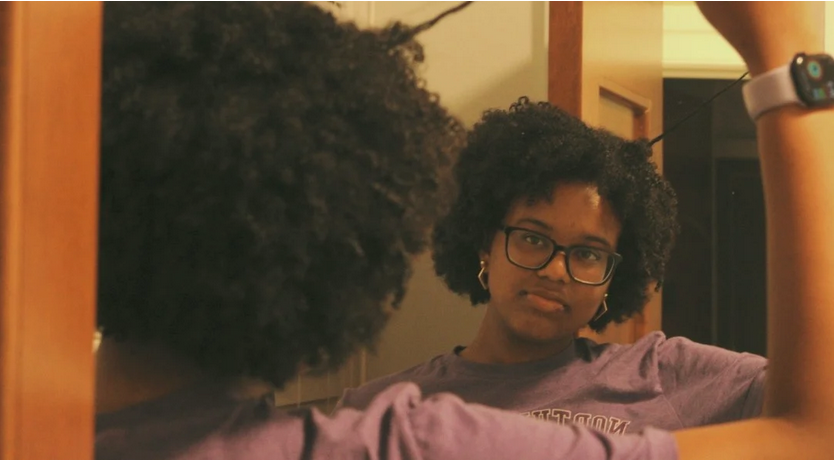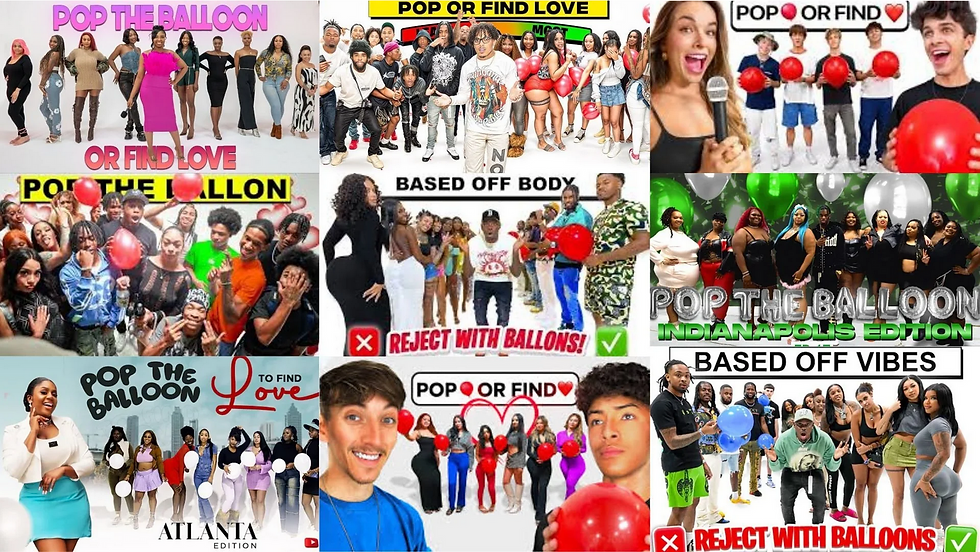Stretchage: Why hair shrinkage isn’t the problem
- Angela Ennin
- Nov 13, 2024
- 4 min read

“I can’t wait till my shit can stay this long,” my brother muttered, catching his reflection in the dusty mirror of an old wardrobe at the back of a furniture store. Surrounded by faded couches and chipped tables, he barely noticed any of it. Instead, he was focused on tugging away at his curls.
I watched as he pulled with all his might at the tight coils on the side of his head, trying to stretch them out and prove he’s got hair for real. It’s a classic move—one I’ve seen a million times and done myself more than I care to admit. There’s this urge to show off the "real" length, like what you see when it’s dry and tight isn’t enough. It’s not just about hair; it’s about this idea that our hair needs to perform, to reveal something more than what’s sitting naturally on our heads. And honestly, it’s exhausting.
Shrinkage isn’t the issue; it’s the way we’re taught to see it. When our hair coils up, pulling itself close, there’s this idea that something’s been lost or hidden. It’s a perception drilled into us—that our natural state needs to reach a standard that isn't made for us. Black women know this struggle well– how difficult it can be to love their hair as it is while the world keeps suggesting it should look like something else. For years, women have been navigating this space, balancing pride for their natural hair patterns with the occasional twist-out or silk press to "switch it up." But now, with more Black men hopping on the natural wave, it feels like everyone is getting caught up in the same cycle.
There’s this pressure to stretch, measure, and define every curl as if our hair is only valid when it shows off its full potential. I’ve seen it play out in conversations where friends pull at their coils, comparing length, asking about the best leave-in conditioner, or figuring out how to get that perfect twist-out. It’s like we’re all trying to prove something. But to whom? And why?
I remember about three weeks ago, my first week of college, when one of my guy friends came to me about growing his hair out. The only pictures of him I had ever seen featured the low, no fuss, classic fade—maybe once in a while he would throw in line-up with some clippers. But now, with a new sea of women on campus and competition with guys with locs, fros and twist-outs, he felt out of place. After hours of convincing (and a trip to Chipotle on him), I decided to get him right.
Before this, I had really never done anyone’s hair. I spent the night scrolling on TikTok for the simplest finger coil tutorials I could find. I can’t lie, I thoroughly played in his head and he ended up with the wormiest, sorriest curls on his head. When I finally handed him the mirror, I expected a “What the actual f***?” but instead I was met with a gleaming smile.
“Man, my hair looks so long now,” he said. “My shrinkage was mad wild before this.”
Never mind the uneven parts or the strands pointing in every direction but down. None of that mattered to him. It’s funny how something as simple as stretching out a few coils made him feel more... noticeable. I think for him length meant stepping into a version of himself that he thought others—especially potential romantic interests—might find appealing. In a world where longer hair often equals beauty, the shrinkage made him feel like he was hiding something that needed to be shown—even if it could only be shown after hours of twisting and pulling.
It wasn’t just about hair for him. He now wore a social badge of hair length and felt as if he could confidently stand shoulder to shoulder with the guys whose styles seemed to demand attention. As silly as it was, I get it. Hair isn't just hair; it’s a conversation, a signal, a way to say, "I’m here."
This got me thinking about the word shrinkage in itself; specifically, how it is a term that we as a community accept despite the fact that it describes hair in an artificial state. His hair wasn’t shrunken, it just was. The word “shrinkage” is enough to make you question what’s natural enough, tricking us into thinking that our hair in its most honest state is somehow incomplete.
The words we use shape how we think about ourselves. Shrinkage makes it sound like something’s being lost. But that’s not it at all. Shrinking, coiling—it’s just what our hair does. It moves. It adapts. It changes.
So why not call it stretch-age? Not to make stretched hair the ultimate goal, but just to show how stretching is a manipulated and passive part of the story, not the whole thing. I know it sounds ridiculous, but with a change in language comes a shift in thinking, from proving something to accepting it. Our hair doesn’t have to fight for space, and we don’t have to measure its worth by how long it looks on any given day.
It’s a thought that circles back to me every time I catch my friend tugging at a curl, trying to make it show more, to reveal its "real" potential. Because here’s the truth: whether his hair shrinks tight to his scalp or stretches down to his neck, it’s still his. It is complete in every form it takes. And that—just as it is—should be enough.
Maybe one day we’ll stop pulling and measuring altogether. We will sit with our hair exactly as it wants to be, letting it exist on its own terms, with no need to stretch the truth.



Comments